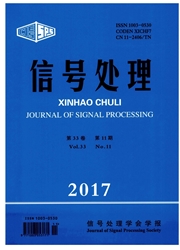

 中文摘要:
中文摘要:
绿色通信是未来无线通信发展的必然趋势,为了提高认知无线网络频谱感知算法的能量效率以及算法稳定性,实现低功耗绿色通信,该文在噪声不确定的环境下分析了基于特征值的最大最小特征值(MME,MaximumMinimum Eigenvalue)频谱感知算法的能量效率,并利用黄金分割优化算法获得了使能量效率最大化的最优感知时间。理论分析和仿真结果表明,在噪声不确定的情况下,基于特征值的MME感知算法的能量效率要明显优于传统的能量(ED)检测算法,且MME感知算法不受噪声不确定性的影响,在低信噪比下具有更稳定的感知性能。
 英文摘要:
英文摘要:
Green Communications is an inevitable trend of future development of wireless communication. In order to enhance the stability and efficiency of spectrum sensing algorithm and promote low-power Green Communications,the energy efficiency of eigenvalue-based MME(Maximum-Minimum Eigenvalue) algorithm under noise uncertainty is analyzed in this paper and the optimal sensing time through the golden algorithm is found. Theoretical analysis and computer simulation results show that eigenvalue-based MME detection algorithm is obviously better than energy detection(ED) with the noise uncertainty and has a more stable sensing performance at low signal to noise ratio. Meanwhile,the results also indicate that noise uncertainty almost has no effect on MME.
 同期刊论文项目
同期刊论文项目
 同项目期刊论文
同项目期刊论文
 Energy-Aware Dynamic Cooperative Strategy Selection for Relay-Assisted Cellular Networks: An Evoluti
Energy-Aware Dynamic Cooperative Strategy Selection for Relay-Assisted Cellular Networks: An Evoluti 期刊信息
期刊信息
